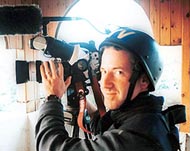Report lists worst censorship culprits
The Middle East, Africa and Asia are the most dangerous places to work if you are a journalist, according to a new report.

Reporters Without Borders (RWB) said on Tuesday that press freedom “remains just a frustrated hope in Africa”, and “informing the public in North Africa, the Middle East and Iran is a very risky business”.
The Paris-based organisation also said that many Asian journalists have been reduced to “propaganda”.
In a separate report, the Brussels-based International Federation of Journalists (IJF) said the “war on terrorism amounts to a devastating challenge to the global culture of human rights and civil liberties”.
The reports coincided with World Press Freedom day which was marked by journalists around the world by a series of protests and sit-ins.
In the Middle East, journalists work in fear of government repression, said RWB.
Five countries in the region were particularly criticised for cracking down on the press – Tunisia, Libya, Syria, Iran and Saudi Arabia.
Censorship
“Pan-Arab satellite TV stations have been on the air since the late 1990s, but authoritarianism and crippling official corruption prevents the growth of truly free news,” said the report.
Twenty-seven journalists were jailed in the region in 2004 for defamation, insulting the head of state, insulting Islam or putting out false news, half of them in Iran.
|
“Pan-Arab satellite TV stations have been on the air since the late 1990s, but authoritarianism and crippling official corruption prevents the growth of truly free news” Reporters Without Borders |
Iraq, however, remains the world’s most dangerous place for journalists and the country where most are kidnapped.
Fifty-six journalists and media assistants have been killed and 29 kidnapped there since fighting began in March 2003.
“US, European and other foreign media have gone to extraordinary lengths to ensure their employees’ safety in Iraq,” said the report.
“These measures clearly affect their coverage of news. Movements are reduced to the very minimum, contacts with local people are only through Iraqi assistants and large expanses of Iraq are not reported on by foreign journalists.”
Censorship and intimidation
In Africa, “journalists pay with their blood or their freedom for the despotism that continues in some countries”, said RWB.
Censorship and intimidation are weapons still widely used by governments, death threats are common, and self-censorship is widespread.
 |
|
Journalists are particularly |
In Asia, North Korea keeps an iron grip on its journalists, who are “reduced to a pathetic role as propagandists”, said RWB.
The report added that Nepal and Bangladesh have slid further into daily brutality while China and Vietnam have tightened their control of news and information.
On the other hand, RWB said that press freedom is generally respected in the Americas, although not at all in Cuba, and it is frequently violated in Colombia.
In Europe, European Union countries “can definitely do better than maintaining prison sentences for press offences and attacking the right of journalists not to reveal their sources”, said RWB.
“Western European countries, often held up as models of democracy, respect press freedom but there are flaws in these journalistic havens of tranquillity.”
War on terrorism
Meanwhile, the International Federation of Journalists has said “the response by governments to the threat of terrorism is out of all proportion”.
Its report, produced jointly with civil liberties group Statewatch, said media and independent journalism suffer a “pervasive atmosphere of paranoia” which is leading to dangerous levels of self-censorship.
|
“An atmosphere of fear and uncertainty is being created and civil liberties are being torn to shreds, even in states with a reputation for tolerance and pluralism” Aidan White, |
The IJF said dissent inside and outside the media is being restricted, fundamental rights to a fair trial are routinely violated, and governments are covertly creating massive databanks for surveillance of their citizens.
“An atmosphere of fear and uncertainty is being created and civil liberties are being torn to shreds, even in states with a reputation for tolerance and pluralism,” said Aidan White, IFJ General Secretary.
Tony Bunyan, Statewatch Director, added: “Everyone agrees with steps taken to ensure public safety against terrorist attacks. But a lot of the measures brought in have little or nothing to do with combating terrorism.
“This report is an alarm call to democracies – in the name of ‘the politics of fear’ we are in great danger of sleepwalking into a surveillance society and democratic values we have taken for granted are being sacrificed in the war on terrorism.”